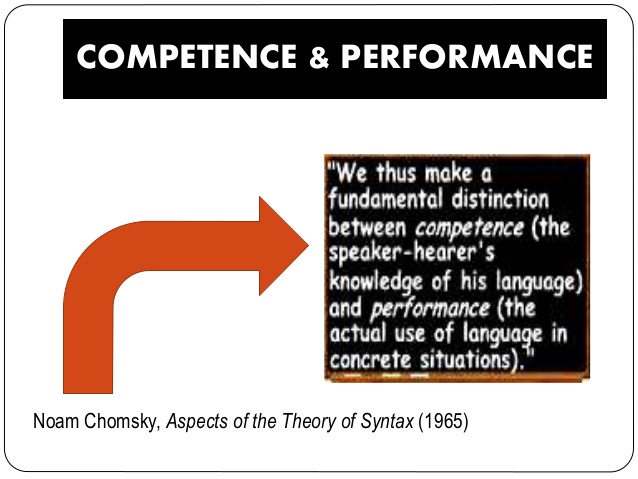Linguistic Competence By Noam Chomsky is somewhat similar to Saussure’s concept of language and parole.Competence, according to Chomsky, is the native speaker’s knowledge of his language, the system of rules he has mastered, his ability to produce and understand a vast number of new sentences.
Performance is the study of the system of rules; performance is the study of actual sentences themselves, of the actual use of the language in real-life situation. So the speaker’s knowledge of the structure of language is his linguistic competence and the way in which it is uses his linguistic performance.
Competence is, then, an underlying mental system, it underlies actual behavior, linguistic institution ability to analyze language, detecting ambiguities, ignoring mistakes, understanding new sentences, producing entirely new sentences. Whereas competence is a set of Principles which a speaker masters, performance is what a speaker does. The former is a kind of code; the latter is an act of encoding or decoding.
Competence concerns the kind of structures the person has succeeded in mastering and internalizing, whether or not he utilizes them, in practice, without interference from the many of the factors that play a role in actual behavior. For anyone concerned with intellectual processes, or any question that goes beyond mere date arranging, it is the question of competence that is fundamental. Obviously one can find out about competence only by studying performance, but this study must be carried out in devious and clever ways, if any successful result is to be obtained. In this ways the abstract, internal grammar which enables a speaker to utter and understand an infinite number of potential utterances is a speaker’s competence.
The Secrets To Linguistic Competence You Must Know
This distinction has caused a lot of arguments in current-day linguistics. Some socio-linguists regard it as an unreal distinction which ignores the importance of studying language in its social setting. They say that many of today’s grammars are based on unjustified assumptions a speaker’s competence rather on his performance. But the division is a useful one, if not carried to extremes. In an ideal situation, the two approaches should complement each other. Any statements concerning a speaker’s competence must ultimately be derived from data collected while studying his performance.
Although Chomsky’ competence/performance closely resembles Saussure’s langue/parole. Yet the main difference is that Saussure streets the sociological implications of langue, while Chomsky stresses the psychological implications of competence. These distinctions are also parallel to a distinction made between code and message in communications engineering! A code is the pre-arranged signaling system. A message is an actual message sent using that system.
The concept of linguistic competence, as introduced by Noam Chomsky, refers to the innate capacity of a human being to understand and produce language. This capacity is inherent and distinct from linguistic performance, which is the actual use of language in concrete situations.
Here’s a guide to understanding Chomsky’s concept of linguistic competence in a tabular format:
| Aspect | Description |
|---|---|
| Definition | The inherent ability of an individual to understand and produce language, irrespective of actual language use. |
| Key Focus | Understanding the innate structure and rules of a language that a speaker knows. |
| Characteristics | – Universal among all humans. <br> – Independent of socio-cultural factors. <br> – Basis for language acquisition. |
| Contrast with Performance | While competence is about the knowledge of language, performance is the actual use of language in daily life. |
| Importance in Linguistics | Helps in understanding how language is processed and acquired, forming the basis for theories in linguistics. |
| Relation to Grammar | Involves knowledge of both the explicit and implicit rules of a language’s grammar. |
| Innateness Hypothesis | Suggests that linguistic competence is innate and genetically programmed in human beings. |
| Impact on Language Teaching | Influences methods and approaches in language teaching, emphasizing the understanding of underlying rules. |
This table summarizes the key elements of Chomsky’s theory of linguistic competence, highlighting its significance in the field of linguistics and language education.
Conclusion
Noam Chomsky’s concept of linguistic competence has had a profound impact on the field of linguistics. It has significantly shaped our understanding of how language is acquired, processed, and used by humans. By delving into the various components of linguistic competence, we can appreciate the complexities and intricacies involved in our linguistic abilities. Understanding linguistic competence not only deepens our comprehension of language but also provides valuable insights into the human mind and its capability to acquire and utilize language effectively.
